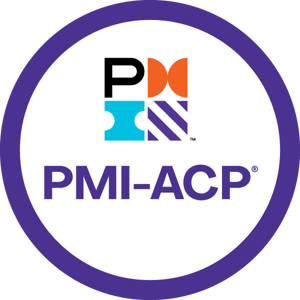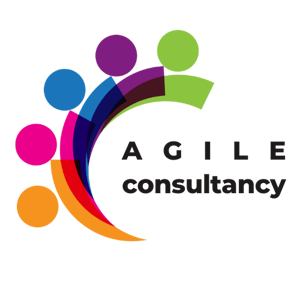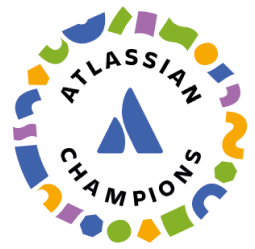Agile practitioners should have a deep understanding of the agile mindset and principles and the ability to apply them in practice. They should be able to create an environment that fosters innovation, experimentation, and continuous learning. Additionally, they should be able to promote collaboration and teamwork, establish a shared vision and working agreements, and develop high-performing teams. They should also be able to use retrospective findings to improve the team and breakdown silos. Finally, agile practitioners should be able to evaluate the team's understanding of agile and tailor the approach accordingly, as well as identify the appropriate inter-team coordination approach
AGILE TRANSFORMATION SERIES
Agile CERTIFICATION
Earn the credibility of a recognised Agile Certified Professional by PMI, USA

PMI's AGILE CERTIFIED PRACTITIONER (PMI-ACP)
Earn the World's Most Credible and Recognised Agile Certification
Certification Overview
The Project Management Institute (PMI) offers a professional certification for agile practitioners titled PMI Agile Certified Practitioner (PMI-ACP)®. The PMI-ACP® is developed by agile practitioners for agile practitioners seeking to enhance their agile skillset, knowledge and application across multiple agile frameworks and methodologies, increase team efficiency, deliver greater value to their organization and customers, and advance their career with a globally recognized certification. This certification is highly recognised in the industry and demonstrates an individual's expertise in Agile project management.
Learning Outcomes
| 1 | Apply agile principles and mindset within the context of the project team and organisation. |
| 2 | Explain how to deliver valuable results by producing high-value increments for review, early and often, based on stakeholder priorities. |
| 3 | Explain how to engage current and future interested parties by building a trusting environment that aligns with their needs and expectations. |
| 4 | Explain how to create an environment of trust, learning, collaboration, and conflict resolution that promotes team self-organisation. |
| 5 | Explain the need for an evolving plan, from initiation to closure, based on goals, values, risks, constraints, stakeholder feedback, and review findings. |
| 6 | Explain how to identify problems, impediments, and risks and prioritise to resolve them in a timely manner. |
| 7 | Explain how to improve the quality, effectiveness, and value of the product and the process. |
| 8 | Attempt certification-type questions to prepare for the PMI-ACP exam using an automated online test bank. |
Target Audience:
Project Managers, Project Leads, Development Teams, Scrum Masters, Product Owners, Team Leads, Product Managers, and Agile practitioners wanting to certify themselves.
Course Pre-requisite:
- Participants with Agile project management implementation experience
-
-
Task 1: Experiment Early
-
Task 2: Embrace Agile Mindset
-
Task 3: Promote Collaborative Team Environment
-
Task 4: Build Transparency
-
Task 5: Foster Psychological Safety
-
Task 6: Shorten Feedback Loops
-
Task 7: Embrace Change
-
Agile practitioners should possess the necessary skills and knowledge to effectively lead within an agile team. This includes a deep understanding of agile principles and methodologies and the ability to create a collaborative team environment that fosters innovation, learning, and growth. They should also be able to apply principles of systems thinking to classify scenarios and identify the importance or risks of each classification. Additionally, they should be able to interpret the output of agile suitability tools and integrate agile models based on needs. Other key skills include the ability to establish team vision and working agreements, form and develop high-performing teams, use retrospective findings to improve the team, and use collaboration practices to break down silos. They should also be committed to the team's decisions even in disagreement and be able to evaluate the team's understanding of agile to tailor the approach
-
Task 1: Empower Teams
-
Task 2: Facilitate Problem Resolution
-
Task 3: Promote Knowledge Sharing
-
Task 4: Promote Agile Mindset Principles and Practices
-
Task 5: Promote Shared Vision and Purpose
-
Task 6: Facilitate Conflict Management
-
Agile practitioners should have a deep understanding of agile methodologies, including (but not limited to): Scrum, Kanban, and Lean, and be able to apply them to project management and product development. They should have experience in product development, building product roadmaps, creating user stories, and managing product backlogs. They should have foundational technical knowledge and be able to work closely with development teams to understand technical requirements and constraints. Practitioners should have excellent communication skills and be able to effectively communicate with stakeholders, including customers, development teams, and executives. The candidate should have strong leadership skills and be able to lead cross-functional teams to deliver high-quality products. Additionally, they should be committed to continuous learning and be willing to stay up to date with the latest trends and best practices in agile project and product management and development.
-
Task 1: Refine Product Backlog
-
Task 2: Manage Increments
-
Task 3: Visualise Work
-
Task 4: Manage Value Delivery
-
Agile practitioners should have the necessary skills and knowledge to effectively manage and deliver projects and products using agile approaches. The candidate should have strong communication and collaboration skills to work effectively with cross-functional teams. Experience in agile project management tools and techniques such as user stories, sprint planning, and retrospectives. Knowledge of agile development practices such as continuous integration, continuous delivery, and test-driven development. Familiarity with agile frameworks and methodologies, including but not limited to, Scrum, Kanban, SAFe, and Lean. Ability to adapt to changing requirements and priorities in a fast-paced environment. Experience in using agile metrics to measure project progress and success. Seeking early feedback from internal and external customers to ensure alignment with their needs. Managing risks proactively to minimize impact on project and/or product delivery. Eliminating waste by focusing on delivering value to the customer. Performing continuous improvement to enhance project delivery and team performance. Engaging customers throughout the project to ensure their needs are met. Optimizing flow by focusing on delivering value quickly and efficiently. In addition, agile practitioners should also have a strong commitment to continuous learning & improvement, and a passion for delivering high-quality products & services to customers
-
Task 1: Seek Early Feedback
-
Task 2: Manage Agile Metrics
-
Task 3: Manage Impediments and Risks
-
Task 4: Recognise and Eliminate Waste
-
Task 5: Perform Continuous Improvements
-
Task 6: Actively Engage Customers
-
Task 7: Optimise Flow
-
Attempt certification-type questions in-class to boost competency, capability and confidence of test-takers in undertaking PMI-ACP
-
Attempt certification-type questions during post-training to boost the competency, capability and confidence of test-takers undertaking PMI-ACP.
Delivered by Atlassian Champion
Course Includes:
- Duration: 4 Days
- Contact Hours: 28
- Mode of Delivery: Online / Onsite
- Post-Training Engagement: Yes
- Certificate: Professional Cert from PMI
-
Trainer:
Atlassian Community Leader, PMI-ACP & Enterprise Agile Coach
- Capacity: 5 pax (min) to 12 pax (max) [for maximum value & engagement]
INDUSTRIES WE'VE IMPACTED
- Software Development
- Information Technology
- Product Development
- Manufacturing
- Financial Services
- Healthcare
- Consulting
- Retail
- Government
- Non-Profit Organisations
- Marketing, Sales and Advertising
- Education
- Telecommunications
- Construction
CUSTOMISED SERVICES
| AGILE TRANSFORMATION |
| Agile Transformation Journey |
| AGILE COACHING |
| Agile Practitioner: A Coaching Approach |
| MENTAL AGILITY |
| LEADERSHIP AGILITY |
| TECHNICAL AGILITY |
|
OPERATIONAL AGILITY |
|
DESIGN AGILITY |
| AGILE CERTIFICATION |
|
PMI's Agile Certified Practitioner (PMI-ACP) Certified Agile Project Management Practitioner Certified Agile Mindset with Jira |
| KNOWLEDGE MANAGEMENT |



